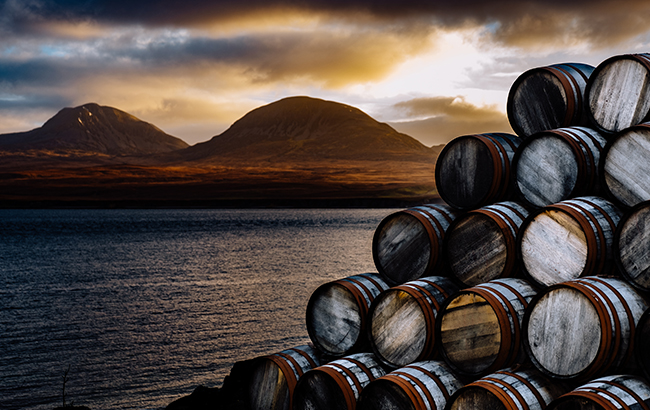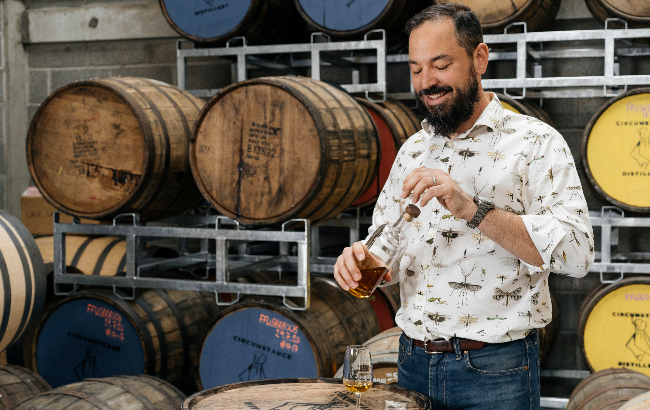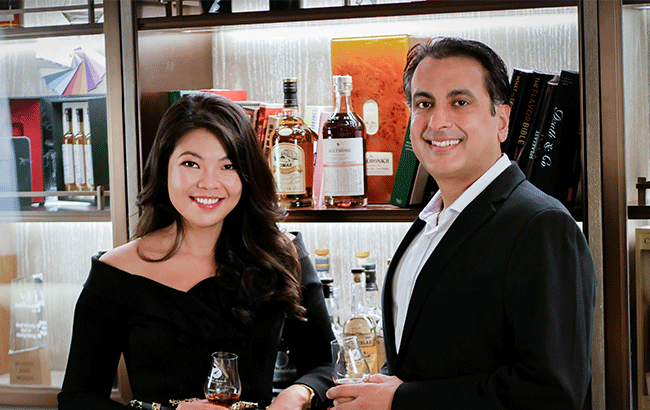Free fall: the risks and rewards of cask investment
Demand for whisky cask investment is sky high – but with potentially unscrupulous players in the market, there’s no shortage of risk involved.

*This feature was originally published in the September 2021 issue of The Spirits Business magazine.
Whisky investment has attracted huge interest over the past decade, encouraged further by record‐breaking auction sales. This rapid growth has subsequently sparked intrigue in high‐stakes investment in the last couple of years: casks.
According to the Scotch Whisky Association (SWA), there are approximately 22 million casks maturing in warehouses in Scotland. Casks have become increasingly available on the open market, with more opportunities for interested drinkers to invest in them as well as bottles.
London whisky cask merchant VCL Vintners saw its sales increase by more than 300% year on year between January 2020 and January 2021. The company also said new account openings were up by 720%.
According to VCL, 94% of new enquiries for the period were from investors completely new to whisky investment, and 56% of all casks sold in the past three months were to clients aged between 18 and 44.
Rickesh Kishnani, co‐founder of Rare Whisky Holdings, says it is easier to invest in casks today than three of four years ago.
“What’s exciting is that this opportunity to buy a cask is very new. We’re seeing demand from Asia, some are buying for investment, some are whisky aficionados. We’re seeing new demand from our customers who are buying casks for when their kids are born. There’s an emotional connection that can come from seeing it over a long period of time.”

Alternative assets
Daniel Milne, managing director of auctioneer Whisky Hammer and retailer Still Spirit, notes that people have had more time during the pandemic to invest their money.
“There’s a shift in people’s minds to alternative asset classes. The reputation of whisky is continuing to rise. It’s an enjoyable and emotional investment.”
Andy Simpson, founder of Rare Whisky 101, adds: “A cask might be worth more than you pay for it in 20 to 30 years. It’s a beautiful thing to watch a cask as it evolves and get samples and draw bottles from it.”
However, there has been a noticeable increase in new companies with little experience in whisky offering huge returns for casks via social media ads and vaguely worded brochures to attract inexperienced investors. It seems some consumers are being misled into buying casks that have a much smaller value than promised or, in some cases, may not even exist.
Simpson notes three rules when it comes to cask investment. He says investors should get: a sample of the liquid; a regular regauge, which determines the amount of liquid in the cask in bulk litres, and the ABV to gain the regauged litres of alcohol; and make sure there is a written delivery order that instructs the warehouse holding the cask to transfer title of the cask to the new owner.
Simpson notes that buying casks can be risky as they are an “easy asset to camouflage”, as some illegitimate firms may sell the same cask, which may not even exist, to multiple people.
“I suspect that there is serious fraud happening right now,” he warns. “It’s almost that perfect scam scenario because when you read a lot of these websites, they’re saying your minimum investment is five years. You get told to wait for five years. By that time, I would pretty much be 99% certain a lot of these companies will not exist. They’ll have moved on, and whether you can find your cask is a different question, unless you have got a delivery order. If you’re just getting a certificate of title, it’s totally meaningless.”
Greg Dillon, founder and whisky director of independent bottler and cask broker Great Drams, also notes the abundance of Facebook ads from new companies promoting 500% to 600% increases in value in a short time. As such, he plans to wind down his cask‐brokerage service.
He explains: “It makes no sense for us to be part of that anymore. From a trade point, most casks now are being offered only to bottlers, and it’s stipulated in the sales contract that it has to be bottled at some point. Most warehouses – we deal with seven or eight – will not even let you set up an account unless you are a bottler or have a view to bottle.”
Rare Whisky Holdings’ Kishnani adds that there has been lot of marketing from new companies that misuse figures from the Knight Frank Index, which is compiled by Rare Whisky 101 and details 100 bottles of the world’s most desirable rare Scotch whisky.
Clamping down
Simpson says the industry is taking action: “The internal industry is really clamping down on who they’re selling casks to.”
Liam Hirt, co‐founder of Still In Cask and Bristol’s Circumstance Distillery, says some companies are quoting annual returns based on unrealistic figures. “Most companies are new and have no history of trading. Consumers should look at the directors of the company to see if they have any experience in whisky. If you’re investing in young whisky, buy it from the distillery.”

Hirt founded the Still in Cask programme this year to ‘democratise the ownership of cask spirits’ by using blockchain technology to sell shares in casks of ageing spirits directly from distilleries. Hirt says the platform allows distilleries to maintain control of their brand, and acts as a brand‐building platform. Producers can “engage with 300 cask‐share owners”, instead of looking to generate a profit through selling casks, Hirt explains.
However, the increased demand for whisky casks as an investment could lead to the death of independent bottlers, according to Will Keogh, sales director for Woolf Drinks. Keogh notes prices of casks have risen hugely, making it harder to buy. “The smaller ones doing it as a side project or a little bit of fun are going to be wiped out of the market; it will only be the slightly bigger bottlers left who have the cash and historical stock.”
Dillon says some new brokers have access to new‐make spirit and are buying in newer distilleries’ stock. “Customers have no idea what the cask quality is like, and are also being charged way too much for what the actual trade market rate would be. No new‐make would cost £6,000; I would be livid to pay more than £2,000 for a cask, unless it was one of the gems like Macallan or Glenfiddich.”
Simpson adds: “People are locking down their stock. Supply is drying up in the market. If the industry gets damaged, the big brand owners won’t sell casks. Unless you’re one of the bigger bottlers, like Gordon & MacPhail where you have your own distillery, then it’s game over.”
Dillon notes that the one big question is how to exit the investment once you’ve bought the cask, as some companies “never say how you can sell it”.
Keogh adds: “Like any investment, the only way you can make money is by having an exit to it. A lot of these companies don’t have an exit for these casks.”
In July, Hong Kong investment group Rare Whisky Holdings acquired a 49% stake in Scottish family business Whisky Hammer and its sister retail business, Still Spirit.

The deal will allow the company to have a base in Asia as it seeks global expansion and gain access to Rare Whisky Holdings’ collection of aged casks.
Together, the companies will create a “new and exciting platform for selling casks that doesn’t’ exist”, Milne notes. The platform will aim to provide consumers globally with a transparent process of buying a cask, with “full cask‐to‐glass service”, adds Kishnani.
Dillon believes there needs to be regulations for the industry. “If someone is saying you’ll get 500%‐plus uplift, where is that coming from? Advice needs to be regulated,” he urges.
However, Keogh disagrees: “I don’t want to see a regulated market. It’s not what whisky should be about. These investment companies need to be shut down. Some warehouses have begun to stop taking on customers. That’s a positive step.”
Rare Whisky 101’s Simpson says the cask market would be “virtually impossible to regulate” due to it being a “very speculative market”.
In terms of the state of the industry in the future, Simpson says it’s hard to tell. “It’s only really in the past 18 months to two years that this market really become inflated. I think what will happen is that because people have been told that they need to roll their investment down the hill for five or 10 years, we’re going to have between two and six years of peace and quiet, where the fraudsters are going to make hay. A lot of these companies will then disappear with ill-gotten profits.
“And then I think there’s going to be a lot of phone calls for people like me who are still around, people are going to say ‘look, I bought this cask for £20,000; I don’t know if it exists. Can I sell it for £50,000?’
“I think it’s a bubble waiting to burst, or a grenade waiting to explode, more like, in about five years.”
Related news
Macallan launches Distil Your World Paris
Suntory offers redundancy as it merges Islay distillery teams
